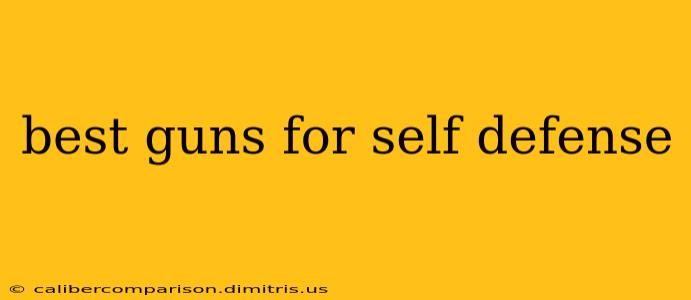Choosing a firearm for self-defense is a deeply personal decision, demanding careful consideration of various factors beyond simple firepower. This guide explores key aspects to help you make an informed choice, focusing on practicality, reliability, and ease of use. Remember: Always prioritize proper training and adherence to all applicable laws and regulations. This information is for educational purposes only and does not constitute legal or professional advice.
Factors to Consider Before Choosing a Self-Defense Firearm
Before diving into specific firearm models, let's examine crucial factors influencing your selection:
1. Caliber: The Power Behind the Bullet
Caliber refers to the diameter of the bullet. Larger calibers generally deliver more stopping power, but this comes at the cost of increased recoil and potentially less manageable control. Popular self-defense calibers include:
- 9mm: A widely popular choice, offering a good balance of stopping power, manageable recoil, and high magazine capacity. Ammunition is readily available and relatively inexpensive.
- .40 S&W: Delivers more stopping power than 9mm but with increased recoil. Magazine capacity is generally lower.
- .45 ACP: Known for its significant stopping power, but with substantial recoil. Magazine capacity tends to be lower than 9mm or .40 S&W.
- .380 ACP: A smaller caliber offering less recoil, making it a good option for individuals with smaller hands or less upper body strength. Stopping power is less than larger calibers.
2. Type of Firearm: Handguns, Shotguns, or Rifles?
The best type of firearm for self-defense depends on your individual circumstances, physical capabilities, and living environment.
- Handguns: Compact and easily concealable, making them suitable for everyday carry (EDC). However, they require more precise shot placement due to their lower capacity.
- Shotguns: Deliver devastating stopping power at close range, thanks to the spread of pellets. However, they are less concealable and more cumbersome to operate.
- Rifles: Offer the highest stopping power and accuracy, but their size and weight make them unsuitable for EDC in most situations. They are better suited for home defense.
3. Reliability and Ease of Use
Reliability is paramount in a self-defense situation. Choose a firearm known for its dependable performance, regardless of the brand or model. Ease of use is equally important, especially under stress. Consider factors like:
- Action Type: Semi-automatic handguns are generally easier to operate than revolvers, but revolvers are typically more reliable in adverse conditions.
- Controls: Ensure the safety and other controls are easily accessible and intuitive.
- Weight and Size: The firearm should be comfortable and manageable for you to handle.
4. Training and Practice
No firearm is effective without proper training. Invest in professional firearms training to learn safe handling, proper techniques, and effective self-defense strategies. Regular practice is crucial to maintain proficiency and build confidence.
Specific Firearm Examples (Not an Exhaustive List)
This section offers examples, but it's crucial to conduct your own research based on your individual needs and preferences.
- 9mm Handguns: Glock 19, Smith & Wesson M&P 9, SIG Sauer P320.
- .40 S&W Handguns: Glock 22, Smith & Wesson M&P 40.
- .45 ACP Handguns: Glock 21, 1911 variants.
- .380 ACP Handguns: SIG Sauer P238, Ruger LCP.
- Shotguns (Home Defense): Remington 870, Mossberg 500.
Conclusion: Responsible Ownership is Key
Selecting the "best" gun for self-defense is a very personal journey. Prioritize thorough research, professional training, and responsible gun ownership. Remember to always check your local and state laws and regulations before purchasing any firearm. The goal is not simply to acquire a weapon, but to become proficient and responsible in its use. This information is for educational purposes only and does not constitute legal or professional advice. Consult with qualified professionals before making any decisions regarding firearms.

